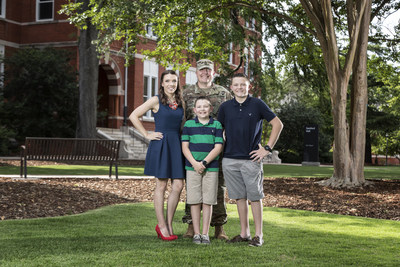Family Matters: Auburn University researchers work to support military families
AUBURN, Ala., Nov. 5, 2019 /PRNewswire/ -- The Military REACH project at Auburn University helps military families and those who work on their behalf, including the U.S. Department of Defense.

The Auburn team, led by principal investigator Mallory Lucier-Greer and co-investigator Catherine O'Neal, works to bridge the gap between military family research and practice. In fact, they literally translate research and put it into practical language so it can be used by those who need it.
Researchers around the country are completing works on family support, resilience, and readiness. The result of each translation, known as TRIP?Translating Research into Practice?reports, are publicly accessible in a digital library, created and managed by the Auburn University Libraries.
Each report contains a summary of key findings and practical applications for military families, professionals who work for or with military families, and policymakers. The DoD, specifically the Office of Military Family and Community Policy, utilizes these reports to make deliberate decisions to meet the current needs of military families.
The partnership with the DoD is a natural fit for Lucier-Greer, an associate professor in the Department of Human Development and Family Studies in Auburn's College of Human Sciences. Her research focuses on the impact of stress and risk factors on the well-being of the family system and members of the family.
It's also beneficial to collaborate with O'Neal, an assistant research scientist in Human Development and Family Science at the University of Georgia. Lucier-Greer said, "Working collaboratively across institutions makes for a stronger and more diverse research team."
Both Lucier-Greer and O'Neal earned their master's degrees in Human Development and Family Studies at Auburn in 2008.
O'Neal's research focuses on evaluating psychological well-being among military family members, particularly exploring relational and contextual effects. The pair work together across several military-family focused research projects that have been supported by the DoD, U.S. Department of Agriculture, U.S. Army, and U.S. Air Force.
Military families are first and foremost families. They encounter many of the same challenges as civilian families, but they also face issues, such as relocation, deployment, and separation, that are strictly associated with the military.
"Family readiness" is a term used by the DoD to ascertain a family's capacity to manage the daily stressors of military life. "Ready" families are those who expect the challenges of military life and are prepared to deal with them.
"Family readiness is an essential component of operational readiness, such that service members with healthy, prepared families are better able to focus on their mission," explained Lucier-Greer. "So, part of my job is identifying resources, supports, and programs that enhance family readiness."
For military families, family matters are predominantly linked to the morale, retention, and resilience of service members. Families need accessible resources and formal supports in place to successfully navigate the challenges of military life.
Military REACH is the result of a collaboration between the DoD's Office of Military Community and Family Policy and the U.S. Department of Agriculture/National Institute of Food and Agriculture, and exists under the DoD-USDA Partnership for Military Families.
Lucier-Greer recently renewed her project for a third year.
Her research team includes faculty members with active research related to military families, youth development specialists, librarians, information technology specialists, and web developers. Auburn Libraries is a crucial partner as they built and assists in the maintenance of the REACH team's state-of-the-art library platform that digitally collects and preserves research related to the well-being of military families.
The collection is available for public use at www.MilitaryREACH.org. Information is also available on Facebook, Twitter and Pinterest @MilitaryREACH.

SOURCE Auburn University
News published on and distributed by:



